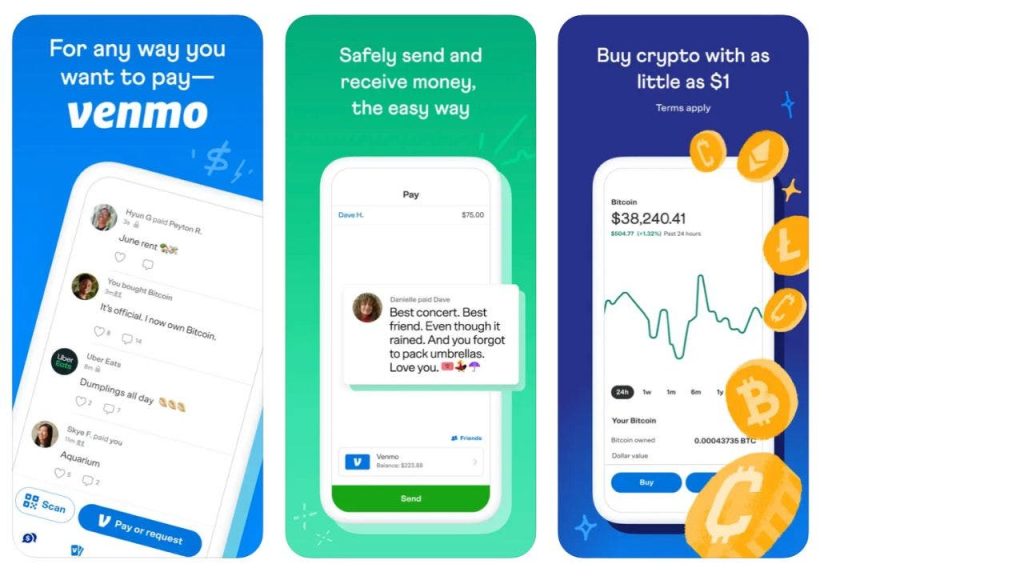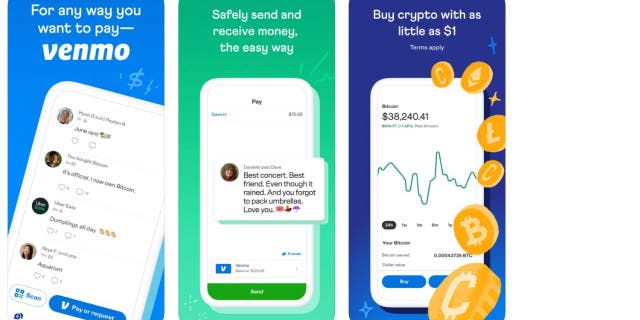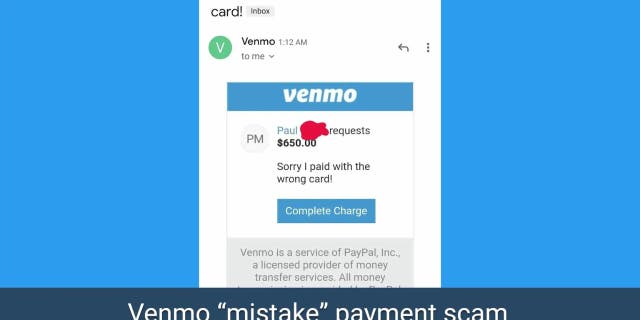
Venmo has grown in popularity, and for a good reason, because it is so easy and convenient to send and receive money electronically between you and another person.
It operates as a digital wallet linked to your bank account or debit card, which enables you to make payments quickly and easily to other Venmo users. The service is popular among younger generations as it provides a simple and social way to split bills or pay back friends for shared expenses.
Additionally, Venmo offers a social feed feature that allows you to see and comment on your friends’ transactions, adding an element of social interaction to the platform. It is available for both iPhone and Android devices.
iPhone: 4.9 stars (at time of publishing)
Android: 4.2 stars (at time of publishing)
However, with all that ease comes much targeting from scammers who want to steal your money, although unlike U.S. bank accounts, Venmo balances are not insured by the Federal Deposit Insurance Corp.
Let’s review what kind of Venmo scams to look out for and how to protect yourself.
CLICK TO GET KURT’S FREE CYBERGUY NEWSLETTER WITH SECURITY ALERTS, QUICK TIPS, TECH REVIEWS, AND EASY HOW-TO’S TO MAKE YOU SMARTER

Venmo is an app that lets you pay from a linked bank account or debit card. (CyberGuy.com)
MASSIVE FREE VPN DATA BREACH EXPOSES 360M RECORDS
Is Venmo safe to use?
Venmo uses multi-factor authentication to secure logins and encrypts all transactions to ensure the safety of your personal information. Also, you have the ability to manage your privacy and passcode settings, adding another layer of protection to your Venmo account. As a result, I would say Venmo is generally considered a safe platform to use.
However, it was designed to use with people you know and trust, such as your friends and family members, and not random people you’ve never met. When making a transaction with a person for the first time, Venmo will even ask that you enter the person’s last four digits of their phone number as an extra safety precaution.
VOICE CLONING IS THE NEW WEAPON IN SCAMMERS’ ARSENAL FOR FAMILY EMERGENCY SCHEMES
Even with these safety measures, however, people still get tricked by scams on Venmo. A common trick that scammers will use is phishing emails. A scammer will send you an email and claim to be a representative of Venmo and trick you into revealing sensitive information, such as passwords, credit card numbers, or personal details by asking you to send your personal information or click a suspicious link to “update your password” or something of that nature. These emails often mimic legitimate communications.
These kinds of scams can occur via text message or phone call as well, and unsuspecting victims may accidentally give out their banking information or even their Social Security numbers.
IS YOUR NEW ANDROID PHONE OR TV BOX ONE OF THE MILLIONS IMPACTED BY PREINSTALLED MALWARE?

Scammers are using phishing emails to trick you into giving away your information. Here’s what to know.items (CyberGuy.com)
Scammers who are trying to sell you things online, such as on websites like Craigslist or Facebook Marketplace, will also often ask for people to pay them through Venmo. This is because Venmo’s user agreement and terms of service state that the app is meant to be used for transactions between people who know each other personally or have an established business relationship.
Scammers may ask for payment through Venmo because they know that the app lacks buyer protections and dispute resolution options. Venmo transactions are instant and irreversible, which means that if you send money to a scammer, it may be difficult or impossible to get your money back.
HOW SCAMMERS ARE SELLING COUNTERFEIT STAMPS ON FACEBOOK ADS
What types of Venmo scams should I look out for?
- Requests for personal information: Venmo will never ask you for personal or sensitive information via email, text message, or phone.
- Rental lease offers: If you’re looking for a place to rent and the landlord asks you to pay upfront via Venmo, don’t fall for it.
- Random prizes or rewards: Sometimes scammers will put up fake competitions and offer to send prize money via Venmo, but will then ask for a person’s Venmo login info to send the money. This is a common scam.
- Overpayment scams: Scammers may overpay you for an item or service and ask you to refund the difference. Once you refund the money, the scammer cancels the payment, leaving you with no money and no item or service.
THE URGENT IPHONE WARNING YOU CAN’T AFFORD TO IGNORE
How can I avoid being part of a Venmo scam?
- Look at the email address: Look closely at the address of the sender if they claim to be from Venmo. If you Google it and it’s an official email address, then it should come up right away. If it doesn’t, then it’s not really Venmo.
- Watch out for fake accounts: Scammers commonly create fake Venmo accounts claiming to be real people and will then ask family and friends of that person for money. Reach out to a person directly before sending them money.
- Public transactions: Be cautious about making your transactions public on Venmo, as scammers can use this information to target you with phishing scams or other fraudulent activities.
MALICIOUS ANDROID SPYWARE DETECTED IN OVER 100 POPULAR APPS
What to do if you believe you have been scammed on Venmo
1) The first thing you should do is contact Venmo support immediately and report the fraudulent transaction. They can provide guidance and assistance in resolving the issue.
2) Second, if you used your bank account or credit card to fund the Venmo transaction, contact your bank or credit card issuer to report the fraud and dispute the charge.
3) The third step is to change your Venmo password immediately to prevent further unauthorized transactions.
4) Also, if you believe you have been scammed, you can file a complaint with the Federal Trade Commission (FTC) to report the fraudulent activity.
5) If you feel your personal data has been stolen, and you want a service that will walk you through every step of the reporting and recovery process, one of the best things you can do to protect yourself from this type of fraud is to subscribe to an identity theft protection company.
HOW TO SHARE YOUR WHEREABOUTS IN ANY SITUATION USING YOUR CELL PHONE
This service will monitor personal information like your Home title, Social Security Number (SSN), phone number, and email address and alert you if it is being sold on the dark web or being used to open an account. They can also assist you in freezing your bank and credit card accounts to prevent further unauthorized use by criminals. One of the best parts of using some services is that they might include identity theft insurance of up to 1 million dollars to cover losses and legal fees and a white glove fraud resolution team where a U.S.-based case manager helps you recover any losses.
See my tips and best picks on how to protect yourself from identity theft by visiting CyberGuy.com/IdentityTheft.
6) Lastly, always report the scammer. If you have any information about the scammer, such as their name, phone number, or email address, report it to Venmo and the authorities.
HOW TO IDENTIFY AND STOP APPS THAT ARE LISTENING TO YOU
Kurt’s key takeaways
While Venmo is a convenient and widely used platform for electronic money transfers, you should remain vigilant against scams by being cautious of phishing emails, avoiding transactions with unknown individuals, and protecting personal information. If scammed, you should report the incident to Venmo, contact your bank or credit card issuer, change your password and file a complaint with the FTC while also providing any available information about the scammer to authorities.
CLICK HERE TO GET THE FOX NEWS APP
Do you feel protected against the growing number of scams? What are your tools and tips? Let us know so we can alert others by writing us at Cyberguy.com/Contact.
For more of my tips, subscribe to my free CyberGuy Report Newsletter by heading to CyberGuy.com/Newsletter.
Copyright 2023 CyberGuy.com. All rights reserved.

 Latest Breaking News Online News Portal
Latest Breaking News Online News Portal




